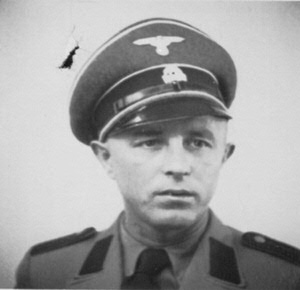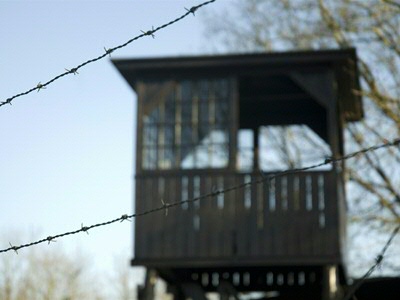Camp executioner Josef Kotalla gained respect through violence

He was one of the imprisoned German war criminals known as the ‘Breda Three’: Josef Kotalla. ‘The executioner of Amersfoort’ is the only German war criminal who would die during imprisonment in the Netherlands. Forty years after his death, he is still regarded as the personification of evil. PhD student Richard Hoving will be the first to map and analyse Kotalla’s entire life in detail in a biography. Hoving will be awarded a PhD by the University of Groningen (UG) on Thursday 24 October.
The German SS guard Josef Kotalla (1908-1979) – whose surname is officially written without an umlaut, not as Kotälla, as he has commonly been referred to – was the extraordinarily cruel replacement commander of Amersfoort concentration camp and led various firing squads. In 1948, he was sentenced to death for abusing and executing dozens of prisoners. Three years later, his death sentence was converted into a lifelong prison sentence. He died in 1979 in the panopticon-modelled prison in Breda.
Failure
The general image is that Kotalla was completely disturbed. But Hoving adds nuance to this. ‘Kotalla’s personal life was already a failure on the eve of the German invasion of Poland. He only attended primary school, had to retake two years, and then hopped from job to job. None of these endeavours were successful. The outbreak of the Second World War was a blessing for him.’ Kotalla had experienced psychological disorders from a young age, but these weren’t as significant as has been assumed. Hoving: ‘He sustained an organic brain lesion at a young age, due to an accident at home. This led to compulsive behaviour and over-precision.’

Respected through violence
‘His cruel behaviour was also largely encouraged by the circumstances in which he worked in the Amersfoort camp, and his ambition to rise to the top. Violence brought him power and respect,’ explains Hoving. The guards in the Amersfoort camp behaved much more violently towards the prisoners than initial camp commander Berg expected of them. ‘In the closed community formed by the camp, there was a sort of Umbau des Gewissens (“conversion of conscience”). As time went on, the SS guards saw no harm in their violent behaviour, while this was still seen as barbaric outside their own world.’
Own method
Although Kotalla was not the only one who acted cruelly, he went a step further than the other SS guards. ‘He developed his own method of torment and abuse. He kicked out hard at the crotches of the regular prisoners, so much so that their testicles swelled up and they had pain for days. The “Kotalla kick” was not only extremely painful, but also humiliating.’
Process
In his biography, Hoving is critical of the post-war justice measures that were taken. ‘The post-war procedure that Kotalla went through was neither fair nor balanced. Former prisoners took their revenge and made false statements to the Bijzonder Gerechtshof (the special court established to sentence defendants in relation to the Second World War). Kotalla was sentenced for killing multiple prisoners, but no evidence of this was presented during his court case.
No mercy
Kotalla’s years in prison were dominated by a constant hope to be released. The Dutch government – under pressure from former resistance members and war victims – refused to let him go. Kotalla died in his cell on 31 July 1979. He was the only German war criminal who died in prison in the Netherlands.
Richard Hoving will be awarded a PhD by the University of Groningen on 24 October. His thesis is entitled ‘De beul van Amersfoort. Biografie van Josef Kotalla (1908-1979)’ [The executioner of Amersfoort. Biography of Josef Kotalla (1908-1979)]. His primary supervisor is Prof. Hans Renders (Biography Institute, UG) and his co-supervisor is Dr Hinke Piersma (NIOD Institute for War, Holocaust and Genocide Studies). A commercial edition of his thesis will be published by publishing company Prometheus.
More information
Richard Hoving, email: rhoving71[at]gmail.com.
| Last modified: | 07 May 2020 3.49 p.m. |
More news
-
12 March 2025
Breaking news: local journalism is alive
Local journalism is alive, still plays an important role in our lives and definitely has a future. In fact, local journalism can play a more crucial role than ever in creating our sense of community. But for that to happen, journalists will have to...
-
11 March 2025
Student challenge: Starting Stories
The Challenge Starting Stories dares you to think about the beginning of recent novels for ten days.
-
11 March 2025
New: Sketch Engine, tool for language research
Sketch Engine is a tool for language research, which can also be used for text analysis or text mining.
